Changing fortunes in Iraq put Obama legacy at risk
- Published
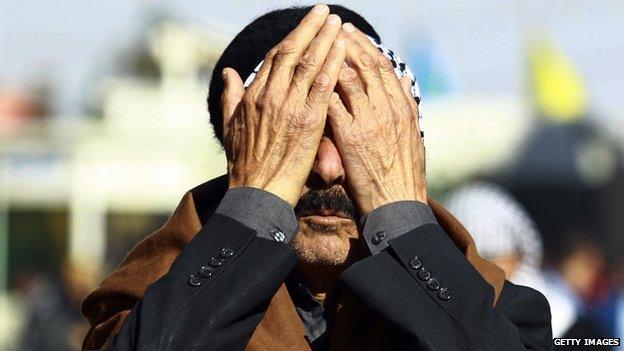
An Iraqi mourns his son, who died fighting Islamic State forces in Ramadi
Analysts, commentators and politicians are increasingly viewing President Barack Obama's strategy on Iraq as one step forward and two steps back - or worse.
It appears likely that a man who campaigned on getting the US out of Iraq will have a key part of his foreign policy legacy determined by military action on the ground in Syria and Iraq over the final year and a half of his presidency.
These past few days provide only the latest example of the challenges Mr Obama faces. Friday headlines touted a US raid in Syria that resulted in the death of IS's senior commander Abu Sayyaf.
It was "a good kill", wrote, external Harvard government professor Juliette Kayyem, and the raid was "flawlessly executed".
The National Review's Tom Rogan, not given to easy praise of the president, called it, external "good news", although he cautioned that "scoring a touchdown isn't equal to winning a game".
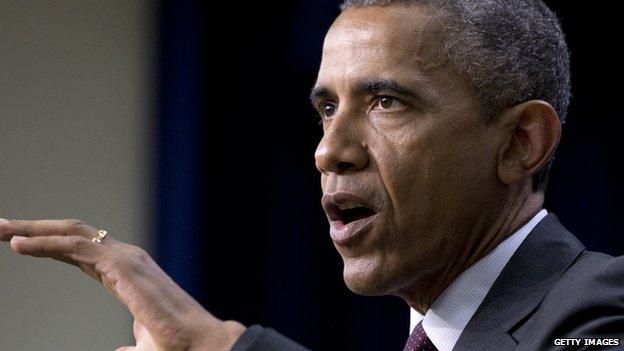
Good news in Iraq has turned bad quickly this week for Barack Obama
As if to prove Rogan's point, by Sunday Ramadi, capital of Iraq's Anbar Province, had fallen to IS forces - and for many, any sense of progress in the battle against IS had turned to ash.
"The fall of Ramadi exposes Obama's weak Islamic State strategy," blares, external the headline of a Washington Post editorial.
The editors attacked Mr Obama's plan to "degrade and ultimately destroy" IS as inadequate because it "has no plan to root out the terrorists' base in Syria".
According to, external the Associated Press's Robert Burns, Mr Obama needs a "plan B" for defeating IS.
"The rout in Ramadi revealed a weak Iraqi army, slow reconciliation and a bombing campaign that, while effective, is not decisive," he writes.
He notes that Ramadi has particular significance for many in the US, as it was a site of a hard-fought victory by US soldiers over Iraq insurgent forces in 2006-2007.
"The full implication of Ramadi's fall is hard to define," he writes. "But it almost certainly includes not only suffering for Ramadi's residents but also a delay in any Iraqi push to retake Mosul, the largest city in northern Iraq and an Islamic State stronghold since last June."
Andrew Malcolm, in Investor's Business Daily, says, external Mr Obama has essentially given up on victory in Iraq.
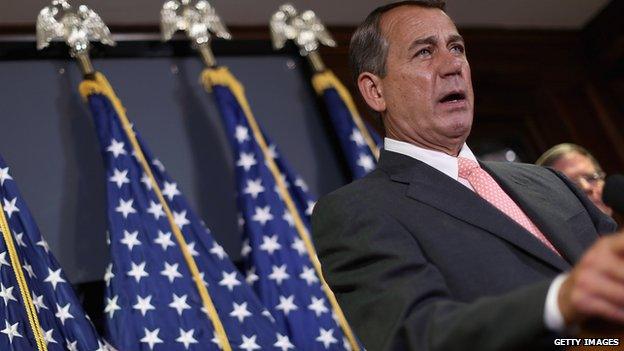
John Boehner says the president's plan in Iraq "isn't working"
"If we didn't know better, we'd suspect the president is trying to run out the clock, hoping to escape Dodge in 610 days, leaving this colossal mess for others," he writes. "Maybe even Hillary Clinton, who played such a large role in making it. On so many occasions Obama has acted or not acted in ways that damage American power, influence, credibility and standing in the Middle East and beyond."
Politicians on both sides of the aisle in Congress also offered sharp criticism.
"The president's plan isn't working," said, external Republican Speaker of the House John Boehner. "It's time for him to come up with a real, overarching strategy to defeat the ongoing terrorist threat."
The senior Democrat on the House Intelligence Committee, Adam Schiff of California, called, external the loss of Ramadi "a very serious and significant setback" and that "alarm bells should be going off" in Washington.
On Tuesday White House press secretary Josh Earnest pushed back, external against these criticisms, saying that the Obama administration plan to combat IS has been successful, "overall". On Wednesday US military leaders promised to provide air strikes and armour to support Iraqi army efforts to retake the city.
"We have seen that there are no quick fixes involved," he said, arguing that a long campaign will have its ups and downs. "We have seen that there's been important progress that's been made."
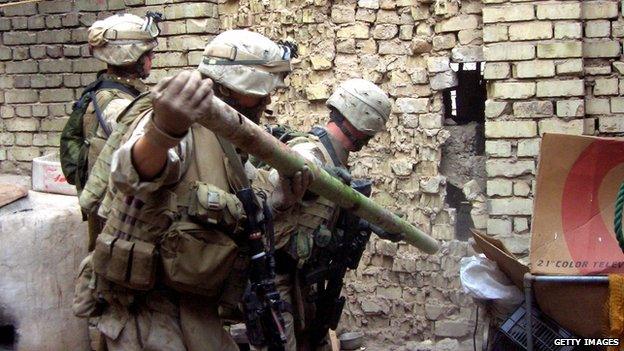
Ramadi was the scene of intense fighting by US troops in 2006-2007
For instance, he cited the "coalition of 60 nations within the region around the world" have joined the United States.
The New York Post's Amir Taheri counters, external that the so-called coalition is more hype than reality, however.
"Over the past nine months, of the 50-plus members of the coalition, only four have joined the United States in conducting airstrikes," he writes, external. "Now, however, even those four have airbrushed themselves out of the picture."
Conservative commentator Charles Krauthammer, on Fox News, called, external the White House response "either delusional or cynical". Ramadi, he continued, "is a tremendous defeat" - yet another example of the fact that the Iraqi army isn't up to the task of defending the nation against IS advances.
The recent round of criticism is effectively a continuation of a larger debate over the situation in Iraq and who, exactly, is to blame for the rise of IS. Was it President George W Bush's decision to invade? Or was Mr Obama responsible for failing to successfully convince Iraq to allow some US forces to remain in Iraq after Mr Bush signed an agreement to withdraw all US soldiers.
"The invasion unleashed profound sectarian strife when minority Sunnis, who had dominated the region for centuries, suddenly found themselves vulnerable to vindictive Shiite leaders installed by America," writes, external Robert W Merry of the National Interest.
"The planting of the US flag upon the heartland soil of Islam inflamed anti-American passions throughout the region, which were intensified by the idea, inherent in the Bush policy, that America would remake the lands of Islam in the image of Western pluralistic democracy".
According to, external Akbar Shahid Ahmed and Ryan Grim of the Huffington Post, it was the dissolution of the Iraq army following the US invasion that led to the inevitable rise of IS once Syria descended into civil war.
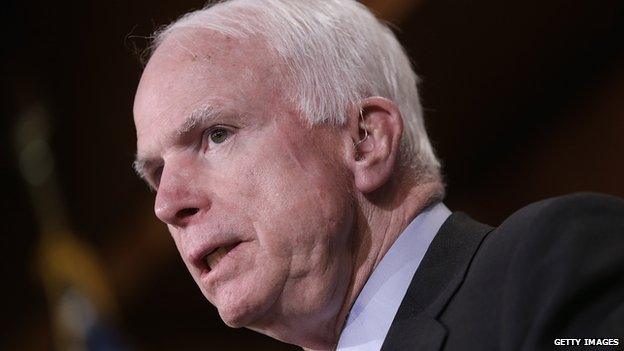
John McCain says failing to leave some US troops in Iraq was a 'shameful act'
"The Bush administration's mismanagement of Iraq encouraged thousands of skilled Iraqis to take their expertise to the anti-American insurgency that eventually became the Islamic State," they write.
Republican politicians like Senator John McCain of Arizona, chair of the Senate Armed Services Committee, counter that Iraq had been pacified by the end of Mr Bush's term.
"Ramadi fell because of the president's failure to leave a residual force behind, which is one of the most shameful acts in recent history," he said, external.
Daniel John Sobieski, writing, external in the American Thinker, agrees, arguing that Mr Obama could have successfully negotiated continued US presence in Iraq if he had wanted to.
"The problem was not that Iraq and Prime Minister Maliki wanted the US to leave, but that the force Obama wanted to leave was just too small," he writes. "President Obama just wanted to get out of Iraq and he offered a deal he knew the Iraqis could and would refuse."
Republican presidential candidates have been grappling with the wisdom of the Iraq invasion, but comments such as these show Democrats - and Mr Obama in particular - aren't free from questions about their responsibility.

The allocation of blame will ultimately be the task of historians. But, as they saying goes, history is determined by the winners. And given the up and down in news from Iraq and Syria over the past days and months, the eventual outcome is still very much up in the air.
"ISIS strikes back whenever the group takes a hit both to boost the morale of its own fighters and to give the sense it remains undefeated even when it does suffer defeats," writes, external Jamie Dettmer for the Daily Beast.
He quotes President Harry Truman's definition of warfare as how IS fights: "Carry the battle to them. Don't let them bring it to you. Put them on the defensive."
Truman, of course, oversaw the US involvement in the Korean War - which eventually ended in a bloody, protracted stalemate.
At this point, is this the best Mr Obama can hope for in Iraq? And, if so, what sort of legacy is that?